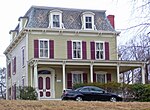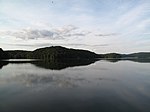Teatown Lake Reservation
Nature centers in New York (state)Nature reserves in New York (state)Protected areas of Westchester County, New York

Teatown Lake Reservation is a nonprofit nature preserve and environmental education center in Westchester County, New York, U.S., located in the towns of Ossining, Yorktown, Cortlandt, and New Castle. The reservation includes an 1,000-acre (4.0 km2) nature preserve and education center, visited annually by around 25,000 people. Known by locals simply as "Teatown", the organization works to conserve biodiversity, teach ecology and promote nature-friendly living. Located in the Lower Hudson Valley's Hudson Highlands, Teatown Lake Reservation conserves open space, educates about the environment, sustaining the diversity of wildlife and plants.
Excerpt from the Wikipedia article Teatown Lake Reservation (License: CC BY-SA 3.0, Authors, Images).Teatown Lake Reservation
Lakeside Loop,
Geographical coordinates (GPS) Address Nearby Places Show on map
Geographical coordinates (GPS)
| Latitude | Longitude |
|---|---|
| N 41.212 ° | E -73.833 ° |
Address
Teatown Lake Reservation
Lakeside Loop
10545
New York, United States
Open on Google Maps










